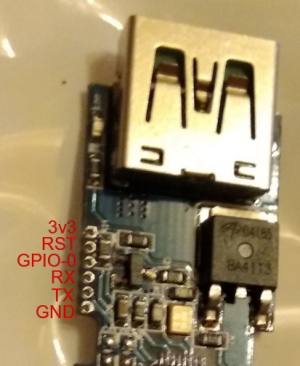Difference between revisions of "IoT - Sinilink XY-WFUSB"
(Created page with "right|frameless *[https://www.cnx-software.com/2020/03/12/sinilink-wifi-usb-power-switch-works-with-tasmota-firmware-supports-up-to-20v-5a/ $5 Sinil...") |
|||
| Line 49: | Line 49: | ||
'''NOTE:''' The housing on the female USB connector is NOT grounded. This is important if you decide to attach a wire to GPIO-0 on the little contacts & ground it for booting to flash-mode. (No need to ask how I learned this...) | '''NOTE:''' The housing on the female USB connector is NOT grounded. This is important if you decide to attach a wire to GPIO-0 on the little contacts & ground it for booting to flash-mode. (No need to ask how I learned this...) | ||
| − | == Adventures in careful work == | + | ==Adventures in careful work== |
I bought 2 of these a while back & took a long time to work up the nerve to flash them. | I bought 2 of these a while back & took a long time to work up the nerve to flash them. | ||
| Line 67: | Line 67: | ||
File:Sinilink Screenshot from 2020-12-07 13-46-21.png | File:Sinilink Screenshot from 2020-12-07 13-46-21.png | ||
</gallery>'''<big>W00t!</big>''' | </gallery>'''<big>W00t!</big>''' | ||
| + | |||
| + | == Some thoughts == | ||
| + | There has been discussion about whether this sort of device is actually useful. | ||
| + | |||
| + | I've found a good reason to have at least one. | ||
| + | |||
| + | I've plugged my programmer through one into my dev machine. I can now disconnect the programmer without physically unplugging it. | ||
Revision as of 15:16, 7 December 2020
- $5 Sinilink WiFI USB Power Switch Works with Tasmota Firmware, Supports up to 20V/5A
- scargill - AliExpress Sinilink WIFI USB Controller
- blakadder - Tasmota Template
| 3v3 | |||
| RST | |||
| GPIO-0 | |||
| RX | |||
| TX | |||
| GND |
Unlike the Sonoff Micro, The Sinilink actually feeds the data pins through.
Also, It's an ESP8285, so it can be flashed with Tasmota!!!
NOTE: The housing on the female USB connector is NOT grounded. This is important if you decide to attach a wire to GPIO-0 on the little contacts & ground it for booting to flash-mode. (No need to ask how I learned this...)
Adventures in careful work
I bought 2 of these a while back & took a long time to work up the nerve to flash them.
Rather than go hunting for 1.27mm pitch pin headers or tiny little pogos, I soldered 30AWG wire-wrap pigtails in the holes. Then I used my prototype ESP-Everything! programmer on them.
In the process, I discovered that the button doesn't seem to be on GPIO-0... So I went back & added wires to GPIO-0 & RST. (Then found out about the non-grounded connector)
Eventually tho... Got it working.
W00t!
Some thoughts
There has been discussion about whether this sort of device is actually useful.
I've found a good reason to have at least one.
I've plugged my programmer through one into my dev machine. I can now disconnect the programmer without physically unplugging it.









